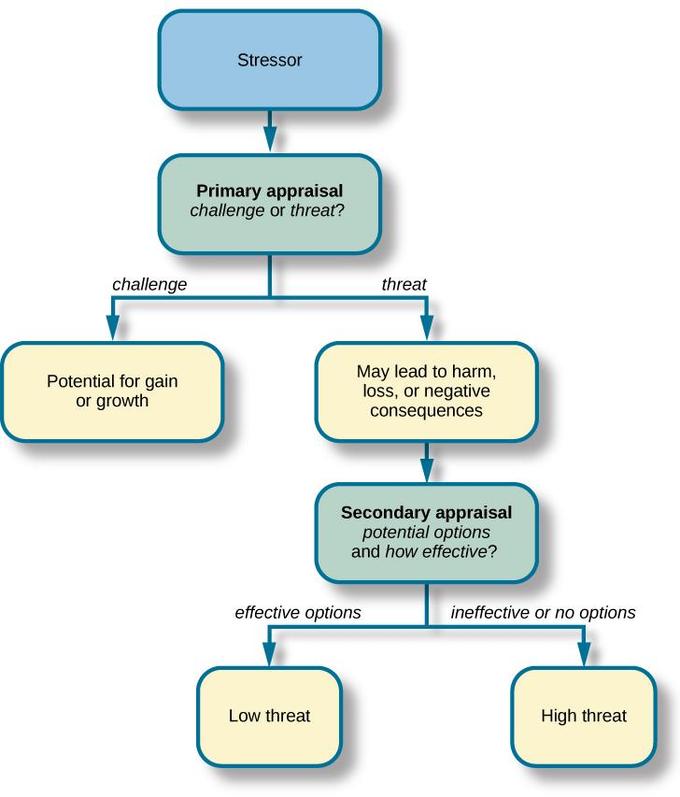Discuss cognitive explanations of stress (22 marks)
1/14
Earn XP
Description and Tags
psychology, IB, Speisman et al., Joshi & Joshi, cognitive appraisal theory
Name | Mastery | Learn | Test | Matching | Spaced | Call with Kai |
|---|
No analytics yet
Send a link to your students to track their progress
15 Terms
Cognitive appraisal theory
Lazarus 1993.
When faced with an event we first must categorise it in a process called primary appraisal to see if it is something harmful, threatening, or challenging. If it is none of those then there is no stress, but if the event is one of the three options then we go through secondary appraisal. Here we ask ourselves “can I cope?”. If the answer is yes then there is low stress, if the answer is no then there is high stress.

Speisman et al (1964) —> Aim
To see if manipulation of cognitive appraisal would lead to different emotional outcomes.
Speisman et al (1964) —> Method
Lab experiment.
56 undergraduate psychology students and 42 middle level airline executives were randomly allocated to one of four conditions and watched a film of indigenous circumcision. During the first condition, named the trauma condition, the soundtrack of the film had all the noises of the surgery and were told about how painful the surgery was. In the second condition, named the intellectualisation condition, participants heard a voice over of an anthropologist explaining the history of the tradition. In the third condition, called the denial condition, the tone of the voice over was a celebration of the boy becoming a man. The fourth condition was a control which had no sound in the video. During the video, the heart rate and galvanic skin responses were measured. Immediately after the video participants had to fill in a questionnaire about how stressed they had felt while watching the video.
Speisman et al (1964) —> Findings
The results showed that the trauma condition showed much higher physiological signs of stress than others. The self report data found that the trauma and control conditions felt the most emotionally stressed.
Speisman et al (1964) —> Use
This study shows the process of cognitive appraisal as it shows by how creating coping strategies seen in the intellectualisation and denial conditions for secondary appraisal can reduce the stress response, as shown by the physical and emotional response measured by this study.
Speisman et al (1964) —> Strengths
High internal validity.
Single blind design removes researcher bias.
Random allocation to groups.
Speisman et al (1964) —> Limitations
Ethically problematic.
Lacks ecological validity.
Self report data is vulnerable to demand characteristics.
Joshi and Joshi (2021) —> Aim
To investigate the association between optimism, as a coping strategy for cognitive appraisal, and perceived stress.
Joshi and Joshi (2021) —> Method
Correlation
Participants were a purposive sample of 79 men and 91 women between ages 18 and 25. They were given a survey with the Perceived Stress Scale -10 (PSS-10) to measure stress and the Life Orientation Test Revised (LOT-R) to measure optimism. Optimism and stress were correlated and tested with a T-test using IBM SPSS software.
Joshi and Joshi (2021) —> Findings
A moderate negative correlation was found, meaning high optimism levels were linked with low stress levels. Females had more perceived stres than males.
Joshi and Joshi (2021) —> Use
This study shows how attitude can influence secondary appraisal, supporting the idea that optimism can increase coping ability and therefore reduce stress response.
Joshi and Joshi (2021) —> Strengths
Large sample with both men and women makes it representative and generalisability.
A survey to gather data is anonymous, so people are less likely to lie.
Joshi and Joshi (2021) —> Limitations
Correlation so causation can’t be inferred.
Only optimism is considered, not pessimism.
The sample was not random so it is less representative.
Biopsychosocial model
While both these studies discuss cognitive appraisal, the stress exists due to social stressors, like the video in Speisman et al, and had biological effects, like an increase in heart rate and galvanic skin response. Therefore it is important to look at stress holistically using the biopyschosocial model of stress.
Additional critical thinking
Is there a pre existing bias for optimism being the superior thinking style?